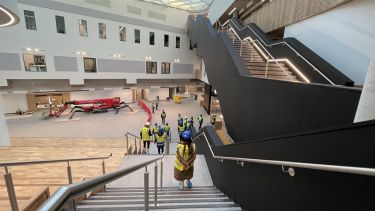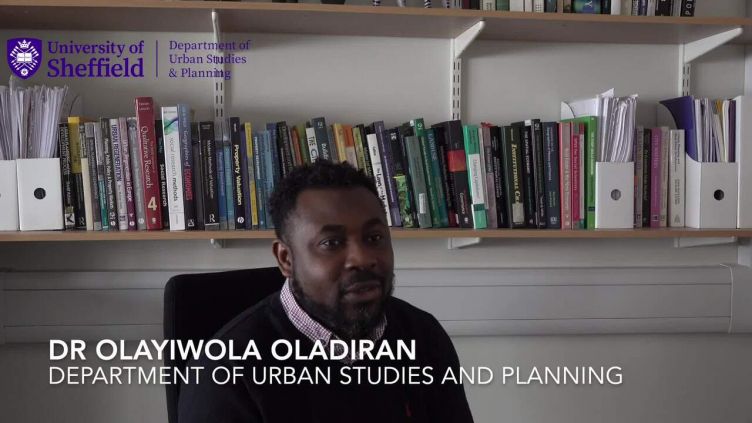Explore this course:
Applications for 2024 entry are now open. Apply now or register your interest to hear about postgraduate study and events at the University of Sheffield.
Real Estate Planning and Development
Department of Urban Studies and Planning,
Faculty of Social Sciences

Course description
This course focuses on providing you with the knowledge and skills necessary to engage in highly strategic policy issues, as well as the more operational aspects of land and real estate use and development. You’ll develop the skills needed to analyse complex problems, recommend appropriate courses of action, take decisions and communicate effectively with professional audiences.
By combining both property valuation and development knowledge with skills in planning and regeneration, you will gain a full perspective on the physical, social and environmental aspects of the built environment. You will therefore be well placed to address real world challenges such as advising on and promoting the effective use or reuse of land and buildings and delivering developments.
This course is designed for students from a wide range of academic and professional backgrounds who wish to specialise in the planning and development process. Graduates from this masters course typically go on to careers in development, valuation and asset management both in the private and public sector.
Accreditation
The MSc is accredited by the Royal Institution of Chartered Surveyors. This means you will benefit from a route to chartered status through the Planning and Development pathway. The accredited degree enables graduates to apply to become a Member of the Royal Institution of Chartered Surveyors (MRICS), which will give you the title of chartered surveyor.
Modules
The focus of the first semester is on the acquisition and understanding of core knowledge and skills. Please note the Professional Skills Development module runs throughout the full academic year.
Core modules:
- Planning Practice and Professional Ethics
-
This module provides an introduction to state-led planning and the key principles that underpin how spatial planning systems seek to shape the built environment. It considers the administrative, legal and political contexts in which planning decisions are made and the role of different groups in mediating land-use development. The module will focus around work to understand how spatial planning systems are constructed and contested by different actors. It will use practical scenarios to explore action surrounding development, the ways in which the state is talked about and how it is organised, as well as the means by which the state makes and implements planning policies. The module also develops critical awareness of the potential impacts of development projects on people and places, introducing the importance of professional ethics for built environment professional practice in spatial planning and surveying.
15 credits - Applied Real Estate Valuation
-
Students studying this module will be introduced to the five methods of valuation that form the basis for working in the surveying profession. Initially basic financial maths will be introduced and applied using client-related scenarios, subsequently using these building blocks within the five methods of valuation. Lectures will provide introductory examples and students will be able to practice using weekly problem-solving tasks and tutorials/help-sessions. Linked to the lectures, professional employability skills will be further developed through the coursework that focuses on providing advice to a client through the production of a valuation report and accompanying appendices, demonstrating adherence to professional standards.
15 credits - Perspectives on Spatial Planning and Development
-
This module is seen as core in developing initial knowledge and understanding of planning and urban development. It critically explores the role of spatial ideas in planning policy and practice and plays a key part in developing critical skills and understanding of different contexts and environments relevant to that practice. The module covers urbanisation in a range of contexts and examines how spatial planning seeks to respond to key economic, environmental and social challenges.
15 credits - Real Estate Economics
-
This course is concerned with the economic analysis of real estate markets. It examines the economic characteristics of property and the way in which these impact on the structure and operation of the property market. It also examines the functional divisions within the property market: use, investment and development and their interactions; and the role of property in the local, regional and national economy.
15 credits - Employability and Professional Skills
-
This module aims to provide a range of supporting skills for home and international students, which will help you get the most out of your learning in Sheffield, and to prepare you for professional employment and career development at the end of your studies. The module has two elements: 1. Cultures of Learning and Professional Skills - understanding how we teach at Sheffield, how to get the most out of your study and how to develop key generic professional/soft skills 2. Employability Skills - preparing you for careers within planning, design, real estate, GIS and related professional areas.
The second semester focuses on the development, application and integration of knowledge and skills.
Core modules:
- Urban Design: Principles and Processes
-
This module aims to introduce and explore the fundamentals of urban design through the evaluation of urban design masterplans and design/planning policy. It is intended to develop core urban design knowledge and understanding for Urban and Regional Planning and Real Estate Planning and Development students. The module will introduce students to the vocabulary of urban design as part of the development process and provide an overview of the key physical components of the spatial environment, the role of urban design in shaping the built environment, and core principles in interpreting and appraising urban design processes and practices. The module will equip students with design evaluation skills to explore, make sense of and evaluate planning and design policy including design codes, masterplans and strategic development frameworks. Teaching will draw on practical examples, lectures, workshops and external speakers/practitioners to develop skills in the evaluation of spaces, their design and the use of planning, development/design policy.
15 credits - Planning Law
-
The course is intended to develop students' expertise in the legal framework for the planning system and to set that legal framework within the wider context of law in the United Kingdom. It considers the origins of planning law and seeks to provide explanations for the powers that the law confers on decision makers. The course focuses particularly on the development control aspects of planning law and looks at the rights and duties of applicants, local authorities and the Secretary of State in making and determining planning applications. It considers the criteria for decision making and the possibilities for the redress of grievance. It considers planning law in the light of wider discussions about human rights and planning gain.
15 credits - Real Estate Planning and Development Project
-
The module explores the interrelationship between real estate development and spatial planning. It examines the real estate development process, its various stages and activities, the roles and objectives of the actors involved in the process and the main aspects of development appraisal. Students will work towards producing an assessment of the planning potential and viability considerations for a real-world development site in an integrated way that fully accounts for the relevant institutional and legal frameworks. The module therefore includes coverage of: market research, planning appraisal, financial appraisal (including financial appraisal using residual and cash-flow methods), sustainability considerations, sources and methods of development finance, sources and management of risk and uncertainty; and the influence of the planning system on real estate development and investment.
15 credits
Optional modules - one from the following list:
- PropTech and Real Estate Innovations (PGT)
-
This module introduces innovations in real estate with an emphasis on PropTech tools and platforms. It provides students with an understanding of the evolution of real estate digital systems and platforms through computing, internet, cloud, IoT, blockchain, virtual reality, AI, drones etc. The module will develop students' foundational knowledge and understanding of the theory and application of data science and analytics and how these can be applied to a variety of real estate operations and practice areas. The module will also enable students to appreciate and develop other soft skills such as creativity, communication, strategic thinking, ethics, entrepreneurship, and problem solving which have underpinned PropTech and other contemporary real estate innovations. The module will be delivered through a combination of problem-oriented, collaborative and project-based learning approaches and students will be encouraged to critically analyse existing real estate operations and practice enablers. The ultimate aim of the module is to enable students to develop innovative systems to further enhance the economic, physical, environmental and social efficiency of real estate operations and practice. Students will gain perspectives on different digital tools in commercial, residential and operational real estate and across the core real estate practice areas and sectors such as land management, development, construction, finance, investment, valuation, portfolio management, asset and property management, agency and brokerage. Students will also gain insight on other real estate innovative systems such as flexible, shared and third spaces, and the role of technology as enablers of these advancements.
15 credits - Citizen Participation in Planning and Development
-
Recent decades have seen a proliferation of initiatives to involve citizens in policy-making, planning and urban governance. There is widespread agreement that 'citizen engagement' can play a positive role in democratizing urban development. However, public participation raises a range of significant challenges for urban professional practice. This module will draw on critical debates about the roles citizens and publics can and should play in shaping the city to reflect on the theory and practice of participation. The module is taught through seminars which structure learning, and help students to research case studies of participatory initiatives.
15 credits - The Urban Climate Emergency (PGT)
-
Climate change is one of the most significant and urgent challenges of the 21st century. Cities generate over 70% of the world's CO2 and consume 60% of global energy, they will therefore play an important part in mitigating the extent of climate change and in adapting to the effects of the climate crisis and its impacts on societies and the global environment. This unit will explore the drivers of climate change and their implications for urban systems, critically considering how urban professionals can respond to these challenges in ways that promote just and sustainable transitions.
15 credits - Urban Regeneration (PGT)
-
Urban regeneration is common practice in the governance of urban change worldwide. Proponents make positive claims about its impacts on the urban economy, society and landscape, critics point to its negative outcomes. Drawing on Global experiences, we will consider the role of the state and other actors in the formulation and implementation of urban regeneration policy in its multi-scalar governance context, and the extent to which communities are engaged in and benefit from these processes. Through critical review of 'real world' cases, we identify the tensions, vulnerabilities and varied impacts of such approaches and consider alternative governance and policy responses.
15 credits - Transport Planning
-
This module will provide students with an introduction to transport planning and policy. The module develops students' ability to think critically about the framing of transport policy using UK transport planning as an example. It will focus on how planners in localities give shape to effective transport strategies, which balance a range of environmental, social and economic objectives.
15 credits - Issues in Housing
-
The aims of the module are twofold: to build both on substantive knowledge, theory and skills about housing gained in earlier parts of both the UG and PG courses, with an emphasis on policy analysis; and to look more closely at the links between housing and planning (in its widest sense) at the local and regional level.
15 credits - International Real Estate Market Analysis
-
This module will provide a comprehensive introduction to key concepts and approaches to the analysis of international real estate markets. This module makes a simple operational distinction between mature, emergent and transitional markets as a first step towards a systematic framework for analysis. It gives an introduction to specific real estate markets and the ways in which they function, and offers generalizable conclusions about the wider operation of global real estate markets. Students will develop knowledge and understanding of global political economy as a context for interpreting real estate markets.
15 credits - GIS for Built Environment Professionals
-
This module aims to introduce key Geographical Information Systems (GIS) principles and techniques to students in fields where GIS is becoming an increasingly relevant tool. The focus is on enabling students to develop an understanding of the potential of GIS and some fundamental GIS skills, through a series of workshops using a range of common software. Assessment is through a written report incorporating visualisations and analysis.
15 credits - Investment Valuation
-
This module builds on the principles of valuation introduced in the Autumn Semester and enables students to develop in-depth specialist knowledge of the investment method of valuation. It therefore focuses on the valuation of commercial real estate investments (office, retail and industrial property), both on a freehold and leasehold basis, for a variety of investment purposes. You will learn to deal with a variety of valuation scenarios by developing and using spreadsheets and provides a further opportunity to prepare a professional valuation report for a client.
15 credits - Law of Business Leases
-
The aim of the module is to introduce and explore pertinent aspects of the legal system relating to commercial and business leases. The module covers areas essential to the work of the surveyor involved in managing assets and the built environment. It thus enables students to develop abilities in offering professionally defensible legal surveying advice.
15 credits - Health, Wellbeing and the City
-
This module explores the urban environment as a determinant of health and well-being and examines how planning and urban design can contribute to improvements in health. Beginning with an exploration of the historic relationship between planning and public health, the module focuses on how the urban environments support or undermine health in relation to mental health, ageing, obesity, air quality and noise pollution. The module also introduces the notion of health impact assessment and further reflects on the contribution of planning to environmental justice and the reduction of inequalities in health.
15 credits
You will complete your dissertation over the summer.
Core module:
- Dissertation
-
This is a core module which allows students to develop and manage an individual research project. The module aims to help students to develop and apply research skills and an appreciation of the issues involved in managing a research project; to develop an understanding of the role of research in relation to theoretical and practical dimensions of the chosen discipline; and to further and deepen knowledge in their chosen field of planning, real estate, urban design, development, or related interests.
60 credits
The content of our courses is reviewed annually to make sure it's up-to-date and relevant. Individual modules are occasionally updated or withdrawn. This is in response to discoveries through our world-leading research; funding changes; professional accreditation requirements; student or employer feedback; outcomes of reviews; and variations in staff or student numbers. In the event of any change we'll consult and inform students in good time and take reasonable steps to minimise disruption.
Open days
An open day gives you the best opportunity to hear first-hand from our current students and staff about our courses.
Find out what makes us special at our next online open day on Wednesday 17 April 2024.
You may also be able to pre-book a department visit as part of a campus tour.Open days and campus tours
Duration
1 year full-time
Teaching
The course will provide you excellent analytical abilities, including the capacity to analyse data using statistical techniques, comprehend financial accounts, and create financial models. In the real estate sector, where data analysis is a key component of decision-making, these talents are highly appreciated.
Case studies, site visits, and guest speakers throughout the course provide students real experience. Real-world initiatives, real estate transaction analysis, and interactions with business experts are all opportunities you'll have.
You'll get the information and abilities you need to excel in the real estate sector as a result of this experience.
Assessment
You’re assessed on your coursework and a dissertation.
Your career
The employability of our graduates is of paramount importance to us. The development of skills, knowledge and personal attributes that enhance your career underpins our programme design. We have a dedicated Employability Manager, Amy Woolley, to support you. We’ll prepare you for employment after graduation.
Department
Department of Urban Studies and Planning
We are the top-rated Royal Town Planning Institute accredited planning school in the UK (REF 2021), with an intellectual reputation for theoretical strength, especially in the fields of urban inequalities and social justice. Study with us and become part of a new and exciting group of urban professionals and change makers.
As a student at Sheffield, you'll develop the knowledge and skills to build a successful career in planning and related urban and environmental professions. You'll be taught by world-leading academics whose cutting-edge research feeds directly into the seminar room. You'll learn using the latest technology in our dedicated teaching spaces; visualising complex data through Geographical Information Systems (GIS) software and using virtual and augmented reality to explore how people interact with urban spaces.
You'll be at the heart of a vibrant academic community and will benefit from an excellent staff-student ratio, resulting in a genuinely friendly and inclusive academic environment. Our open-door policy means you can drop in on your lecturers at any time during their office hours, without an appointment. We believe this will help with your wellbeing and encourage your intellectual curiosity.
We work with national governments, international bodies such as the UN, research councils, private business, the voluntary sector, and local communities to shape policy and inspire change in urban environments. Join us to explore the pathways to creating fair, just and sustainable places.
Entry requirements
Minimum 2:1 undergraduate honours degree.
We may also consider your application if you do not meet the standard academic requirements but you have relevant professional experience.
Overall IELTS score of 6.5 with a minimum of 6.0 in each component, or equivalent.
If you have any questions about entry requirements, please contact the department.
Fees and funding
Apply
You can apply now using our Postgraduate Online Application Form. It's a quick and easy process.
Contact
usp-admissions@sheffield.ac.uk
+44 114 222 6900
Any supervisors and research areas listed are indicative and may change before the start of the course.
Recognition of professional qualifications: from 1 January 2021, in order to have any UK professional qualifications recognised for work in an EU country across a number of regulated and other professions you need to apply to the host country for recognition. Read information from the UK government and the EU Regulated Professions Database.





